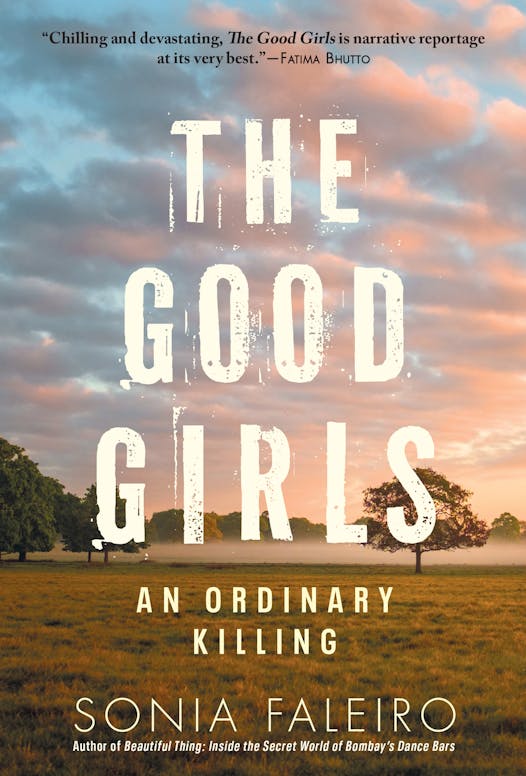In Hindi, India's predominant language, there's a word that is sometimes used to describe a devastating incident. The literal translation of "kand" is "scandal," Sonia Faleiro writes, yet it "implies something so terrible that it is practically unforgettable." Such an event is the subject of "The Good Girls," the Indian journalist's powerful new book.
Lalli Shakya, 14, was a poetry-besotted "romantic." Her cousin, 16-year-old Padma Shakya, enjoyed embroidery and singing. Schooling was limited in their northern Indian village, and they spent most days tending livestock and preparing meals. Their fathers would choose their husbands. Padma was about to "be deposited at the threshold of a new family, as a bride to a man she had never seen. In two years," Faleiro writes, "it would be Lalli's turn."
On May 27, 2014, Lalli and Padma attended a fair. They returned home, then left again. Their families were poor, and they had no running water; the girls said they going to relieve themselves outdoors. The next morning, their bodies were found hanging from a tree. How could such a tragedy have occurred? This is a question with several answers.
In a country where "crimes against women are ubiquitous," Faleiro writes, a punishing caste structure perpetuates such tragedies. The Shakyas, among "a broad category" termed "Other Backward Classes" in India's constitution, are effectively barred from good schools, health care and jobs. Every year, "hundreds, if not thousands," of women and girls are murdered for relationships with men of different castes or faiths.
Protests following the 2012 rape and murder of a woman on a Delhi bus spurred tougher laws, but rights groups say India remains perhaps the most dangerous country for women.
In this case, inadequately trained police responded to the impoverished teens' deaths with alarming carelessness. Evidence was tainted. A laborer with no medical qualifications performed the postmortems. A 19-year-old man who attended the fair, and who might've later rendezvoused with the girls, was among five arrested, but authorities couldn't substantiate rape and murder charges.
Suspicion fell on the cousins' families. Some relatives, reportedly ashamed by rumors that Padma and Lalli were intimate with the young man, were investigated for "honor killings." Authorities eventually ruled that the girls committed suicide. Perhaps, this questionable theory went, they feared grave punishment at home. Ultimately, the chaotic investigation precluded a decisive finding.
Her social analysis is enlightening, but Faleiro's book is most poignant when it's focused on the girls' unfinished lives. Padma had recently embroidered "a parrot with a chunky green belly and a furry red beak." Her cousin "wanted to be a doctor; no, she wanted to be a teacher. 'I want to be something,' she had always said." Now, they "would never be anything at all."
Kevin Canfield is a writer in New York City.
The Good Girls: An Ordinary Killing
By: Sonia Faleiro.
Publisher: Grove, 352 pages, $26.

The 5 best things our food writers ate this week

A Minnesota field guide to snow shovels: Which one's best?

Summer Camp Guide: Find your best ones here

Lowertown St. Paul losing another restaurant as Dark Horse announces closing


